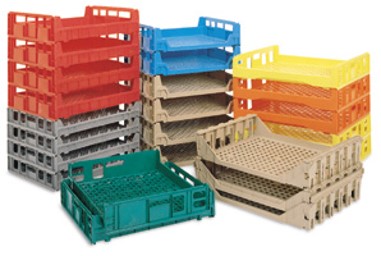The below case studies demonstrate success in stopping organized tray theft in Columbus, Chicago, and Miami. Each case, although in different locales and involving different businesses, led to thorough investigations and prosecutions because specific procedures were incorporated. Those key elements are
- Filing consistent and repeated police reports
- The ability to document and demonstrate a pattern of the problem
- Providing irrefutable physical evidence through clear communication with authorities
Columbus, Ohio 2014
Losses Leading to Investigation: This investigation was initiated after over 50,000 crates, trays, beverage shells, and racks were stolen, equaling over $400,000 in losses.
Evidence Gathered and Given to Police: The businesses incurring losses filed repeated and consistent police reports. They provided a trend recording of regions/locations that were frequently stolen from with dates. Lastly, the businesses provided essential corporate marking information on stolen items.
Police Actions: Police reviewed the provided details regarding corporate markings on the stolen plastics. Police then surveilled the thieves that were carrying marked plastics to recycler. Finally, a sting operation authorized finding over one ton of reground plastics and thousands of unground commercial containers.
Top 3 Lessons from the Investigators:
- The biggest factor was details regarding markings and descriptions of stolen plastics.
- Reports from impacted companies of specific loss figures made it easier to justify using department resources.
- Giving details regarding locations allowed us to coordinate with other relevant jurisdictions ahead of time.
Chicago, Illinois 2015
Losses Leading to Investigation: This investigation began when companies reported losses totaling nearly $50,000 from over 6,000 stolen trays, totes, and crates.
Evidence Gathered and Given to Police: As in all the case studies, the businesses filed numerous police reports consistently detailing the loss of plastics. The evidence collecting process in this investigation was highly robust: private investigator surveillance, tracking data from GPS hidden on stolen trays, and video footage of the actual thefts occurring.
Police Actions: Stemming from visual surveillance by private investigators, police conducted traffic stops which confirmed lead suspects and thefts. This led to raids of two recycling facilities, which uncovered stolen commercial plastic assets amounting to tens of thousands of dollars.
Top 3 Lessons from the Investigators:
- Building a network between law enforcement, other impacted companies, and you can elevate the issue.
- Categorize and monitor your losses regularly.
- Have a member of your organization become the point person for interaction with investigators.
Miami, Florida 2016
Losses Leading to Investigation: Police became active in this case when businesses reported the theft of more than 210,000 trays and crates, amounting to $1.5 million in plastics.
Evidence Gathered and Given to Police: Leading up to police action, a private investigator collected visual and video surveillance, and businesses documented trends and locations of stolen items. The businesses then filed repeated police reports and communicated with law enforcement’s point person.
Police Actions: As a first step, law enforcement organized a point-person for interaction with the private investigators. Police then conducted visual, video surveillance of theft of crates, as well as drop point locations. Ultimately, in one of the largest busts of organized tray theft, authorities arrested 22 suspects connected to the theft operation, discovering thousands of pounds of reground plastic and recovering trays of local distributors.
Top 3 Lessons from the Investigators:
- Utilizing private investigators, especially ones with law-enforcement experience, can aid in developing police relationships.
- Utilizing rewards programs for your employees can help identify specific areas where theft occurs.
- Maintain regular communication with police and prosecutors due to the amount of time cases can often take.



